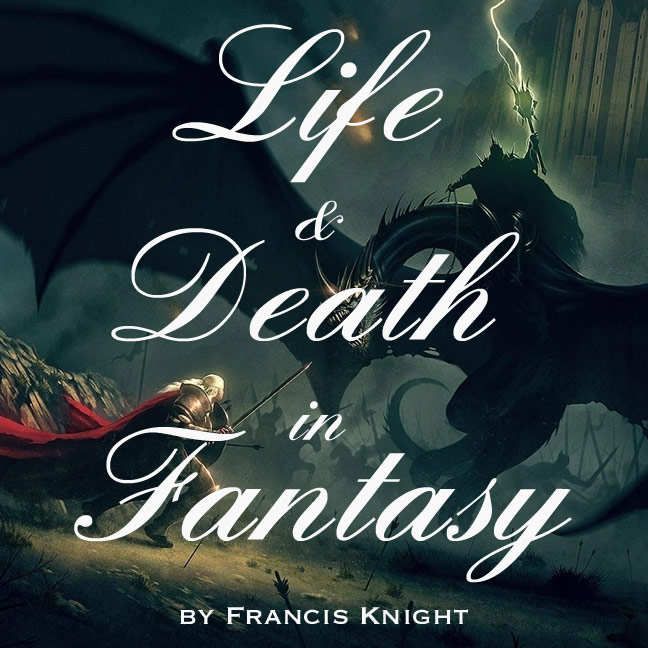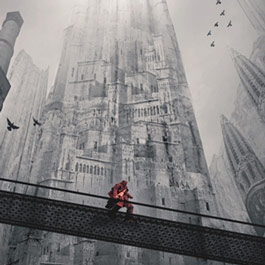
Art by Nick Deligaris
Fiction, it often seems to me is becoming more preoccupied with deaths, both death itself and the manner of it in nasty, gruesome ways. Why? Many reasons I’m sure – a more cynical age for one. Another is the western obsession with Youth and Beauty as though they alone can stave off Death and Decay. As a society we are more personally removed from death than at any time in history, yet via media at the same time we are exposed – at an emotional distance – to deaths we would once never have known about. Where once bodies were laid out by their family, washed, dressed, respects given, now they are hidden away in their coffins, dressed by strangers, almost as though we’re ashamed that one of us let death overtake him. It is no longer a part and parcel of our lives in the same way – ably demonstrated by my co worker, who moonlights as an embalmer. When she tells people, almost every reaction is a variation on ‘Ewww, you touch dead people!’. So, with death removed from our real lives, less matter-of-factly “there”, perhaps we delve into it more in fiction, because it’s one of the few places we have left.
 Death and fear of it have always been a large part of the human psyche, things they tell stories about to try to make sense of it. Death and what happens after features in the Bible, the Koran, the Torah, in the Havamal, where it says; Cattle die and kinsman die, thyself soon must die, but fair fame never dies for those who earned it. Ultimately, it’s about the wish to transcend death, to know it isn’t the true end, that maybe we can cheat it in some way.
Death and fear of it have always been a large part of the human psyche, things they tell stories about to try to make sense of it. Death and what happens after features in the Bible, the Koran, the Torah, in the Havamal, where it says; Cattle die and kinsman die, thyself soon must die, but fair fame never dies for those who earned it. Ultimately, it’s about the wish to transcend death, to know it isn’t the true end, that maybe we can cheat it in some way.
Because, apart from taxes, it’s the one thing we all know we’ll have to confront one day. How will we do? Will we face it with quiet courage, or will we break at the end? It overshadows much else; it’s in there when we try to eat healthily, when we promise to exercise more, trying to fend off the inevitable. When we make sure the brakes work on the car, or hover over our kids with bated breath as they do that foolhardy thing that’ll have someone’s eye out and don’t come running to me with a broken leg. Death is inextricably linked with life – it’s been argued that without death, there IS no life and so to explore one is to explore the other.
So why, specifically, fantasy? What does it bring to the discussion? For me it’s this: I can do things in fantasy that aren’t possible in the real world, and through that I can apply stresses and strains to my characters that are impossible, just to see what cracks, how it changes them as people. By using things that are not and cannot be real, we can show the things that are real in sharper relief. And let’s face it, whatever genre we’re writing in, what we are essentially writing about is people, the human condition.

Art by Marc Simonetti
As a reader, part of it is the way a text elicits emotion through such things as grief, or standing strong in front of certain death etc. In old myths, and in many religious texts, there is almost a blueprint for how to behave when danger comes to call, and the perils of not doing it. In fiction there’s a similar feel for me very often, particularly in classic fantasy. As an example, I would hope that if I ever came face to face with an undead guy on a flying dino, I’d be as steadfast as Eowyn. And the grief when Eomer finds her “dead” chokes me every time. Both conjure in me the sentiments of those old myths. Almost every character in the book faces death in one form or another. Some acquit themselves better than others, and that’s my lasting impression of them – how they did or didn’t face it. In many ways, it defines them.
But Lord of the Rings is a different book to many, about a faraway and golden time. That’s part of its appeal. Other books are not, and that’s their appeal too – they relate the struggles of people not so steadfast and heroic, and yet show that even the worst of us can have our moment of fair fame in the face of death. They show us that sometimes death is stupid, or vapid, or a useless piece of bravado against tyranny, or ignored. We can see all the marvellous and terrible ways one can confront the inevitable, and all without leaving our own heads.
Death and fear of it in fiction is an exploration of what it means to face it, that this, then, will be our final test? That the analysis of a hero is in how he faces it, or doesn’t? And that perhaps one of those heroes or heroines will help give us the courage to face it when the time comes. Perhaps, and in that it’s not restricted to fantasy, or any one genre.


Excellent analysis. I work at a cemetery in Ontario, Canada and this sums up a lot of what I feel.
Thanks
I am convinced that as a society we are doing death “wrong.” There are many things we do right – hospices, right-to-die, and so on – but on the whole, we pretend it doesn’t happen, and that is silly considering each us has experienced the death(s) of a loved one. As children we lose our grandparents. As adults we lose our parents or (fates forbid) a child. One hundred years ago people knew how to handle death. There were customs, rituals and things to say. Today we look away guiltily, left speechless by a friend’s loss – or, if you are the one who experienced the loss, you feel awkward for making everyone else uncomfortable.
Fantasy does have that aspect of allowing characters to face down their deaths. In a way, that is the ultimate challenge we can give a character. And yet, we rarely see what comes after that – the burial, the grief, the distribution of the dead one’s mundane tasks.
Yes, exactly – death used to be part of our lives, now it’s often hermetically sealed away from us, so we no longer quite know how to handle it.
And interesting point about the aftermath. Perhaps in most stories (at least fantasy ones) the death is part of the story, and the rest isn’t so much. Though I could see some stories that would require that to be present as part of the story. Hmmm…food for thought!
After I wrote that I realised some of what I suggest could be a little dull to read. But still! The point is made.
The privilege of great wealth, one which makes it highly desired, is that you can pay someone else to do all the unpleasant things and remove them from sight altogether. The US has enjoyed such great wealth that those of us who live there have become accustomed to being able to make problems “disappear”.
Someone kills the animals you eat, another hauls your trash away, another comes and cleans your home, another sequesters the criminals and riff-raff where they won’t cause you anxiety. Plus we have torture chambers for the “terr’ists”, hospitals for the sick, hospices for the dying, an undertaker for the dead, asylums for the disturbed, gurus and therapists to reassure us with comforting truisms. At some point, another sort of poverty sets in, a poverty of experience maybe.
Meanwhile the “unpleasantness removal” system proliferates and a new moral panic has to be found to grow and feed it on a regular basis. Television substitutes remote suffering and crises, and makes us think that somehow we know enough about them to support whatever the President wants to do (which is usually: dropping bombs on people) in Serbia, Syria, Somalia or wherever.
The fear of death, of personal annihilation, is one of the prime starters for this impetus to live at an ever increasing distance from…well, from life, really, or a significant part of it anyway. There are certainly times when you have to distance yourself to stay sane, but when it becomes too easy to do, and you develop an institutional process for it that takes on a life of its own, you don’t live well, individually and as a society.
What’s interesting is we have all these safeguards to avoiding dealing with death, and yet, we’re not safe. We’re never safe. Tumours form in our bodies, death-seekers bring assault rifles into public places, buses fail to see stop lights and bang into those crossing the street. And it comes as such a shock, to realise our mortality when it does jump up and thwack us.